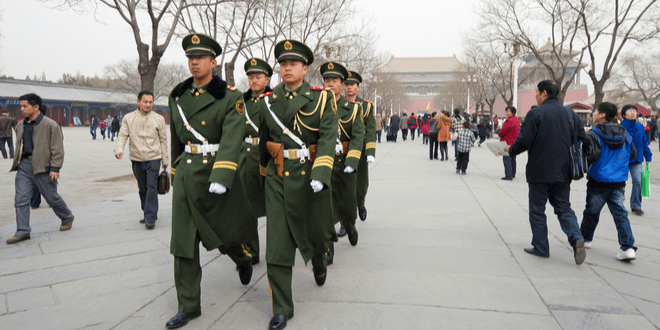A recent report described how China’s top leaders are convinced that a U.S. led global wave of anti-China sentiment may lead to a military confrontation between the two countries.
An exclusive report by Reuters published on Monday stated that a report was presented early last month by the Ministry of State Security to top Beijing leaders including President Xi Jinping. The report was drawn up by the China Institutes of Contemporary International Relations (CICIR), a think tank affiliated with the Ministry of State Security with its focus being the U.S. The institute has held considerable influence over China’s foreign policy decision-making process due in part to its close organizational proximity to the Communist Party’s Central Committee
The CICR report concluded that global anti-China sentiment is at its highest since the 1989 Tiananmen Square crackdown.
“The presentation of the report shows how seriously Beijing takes the threat of a building backlash that could threaten what China sees as its strategic investments overseas and its view of its security standing,” Reuters wrote. “Relations between China and the United States are widely seen to be at their worst point in decades, with deepening mistrust and friction points from U.S. allegations of unfair trade and technology practices to disputes over Hong Kong, Taiwan, and contested territories in the South China Sea.”
Reuters noted that President Trump has been highly critical of China’s role in the spread of the pandemic and is considering retaliatory measures against China which may include imposing tariffs on Chinese imports.
“It is widely believed in Beijing that the United States wants to contain a rising China, which has become more assertive globally as its economy has grown,” Reuters wrote. “The [CICR] paper concluded that Washington views China’s rise as an economic and national security threat and a challenge to Western democracies, the people said. The report also said the United States was aiming to undercut the ruling Communist Party by undermining public confidence.”
A worst-case scenario outline in the report, according to Reuters, included the possibility of a military exchange between the US and China.
A military conflict between the U.S. and China is a horrific possibility. China’s army, known as the People’s Liberation Army (PLA), is the world’s largest military force and constitutes the second-largest defense budget in the world after the U.S. The PLA is one of the fastest modernizing militaries in the world and has been termed as a potential military superpower,
A recent analysis of China’s military capability by Jeremy Black, Professor of History at Exeter University, was published by the Foreign Policy Research Institute. In his analysis, Black noted a “pronounced buildup of naval weaponry in recent years.”
“These are clearly designed to match American warships, and raise interest in China’s ability to sustain distant interest by sea,” Black wrote, noting China’s multiplying alliances that increase their military growth exponentially. “So, the notion that China might automatically ‘limit’ itself to dominating a ‘near China,’ of the East and South China Seas is implausible… It was that principle [of access denial] that led the Japanese to attack Pearl Harbor in 1941, and the modern counterparts would be seeking to thwart the use of Guam and to block chokepoints of naval access.”
“This approach presupposes that the Chinese wish for war, which is highly unlikely, but any policy inherently requires planning for the possibility of conflict, and that is true of the Chinese as well as for their possible opponents. Of course, that brings with it the danger that preparing for conflict might actually help precipitate it.”
“Of course, a full-spectrum Chinese challenge includes hybrid warfare in its various forms, including cyber-warfare, the encouragement of dissidence, and a range of unconventional and/or irregular forms of conflict.”
Source: Israel in the News

